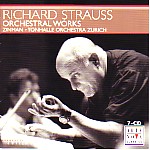As a Strauss conductor, David Zinman’s interests lie more with making sense of the composer’s complex linear strands than reveling in his dazzling sonorities and dynamic extremes. In other words, Zinman’s a line guy, while Straussians like Kempe and Karajan are chord guys (Strauss is a chord guy disguised as a line guy). There’s much to savor over the course of these seven discs. As my colleague Victor Carr Jr accurately observed in his earlier review of Disc 1’s contents, the early Macbeth receives one of its hottest, most impassioned interpretations, while Aus Italien’s wide-eyed lyricism is restrained to a fault. Ein Heldenleben hits and misses: the misses include the sluggish, square-toed woodwind chattering in “The Hero’s Adversaries”, the hits include a breathtakingly unraveled “Battle”. But note the dignified calm in Tod und Verklärung’s final pages, and, at the outset, string playing whose careful dynamic gradations and rhythmic alignment would have made Toscanini proud.
The promise of Also sprach Zarathustra’s first half doesn’t quite pan out in the second (a sluggish, underplayed Dance Song and Night Song). By contrast, Don Juan is sharply characterized and proportioned, though not so sizzling as Kempe’s or Szell’s–but whose is? Some may find Till Eulenspiegel a bit hard-driven and unaffectionate, yet Zinman’s gaunt, chamber-like conception grows on me with each hearing.
Zinman’s Alpine Symphony mirrors the rounded elegance of Karajan’s early digital DG recording, but with more accomplished first-desk playing and better-balanced sonics. He also surpasses the venerable Böhm traversal of the garish Festival Prelude (perhaps the worst orchestral composition by a major composer). Zinman leads a disciplined Sinfonia Domestica that proves more genial and less regimented than Szell/Cleveland, even if we’ve long been spoiled by Neeme Järvi’s stunning brass section. Although Zinman’s Metamorphosen doesn’t match Karajan’s uniform tonal beauty or Kempe’s surging climaxes, he takes uncommon care to place the solo and ensemble lines in proper perspective.
All of the works with soloists are played well, especially Simon Fuchs’ supple, rich-toned traversal of the Oboe Concerto and Roland Pöntinen’s incisive, frighteningly assured left-hand work in the Parergon. While Kempe/Dresden reigns as the Strauss collection of reference, Zinman’s clear-headed, intelligent interpretations are well worth getting to know.
































